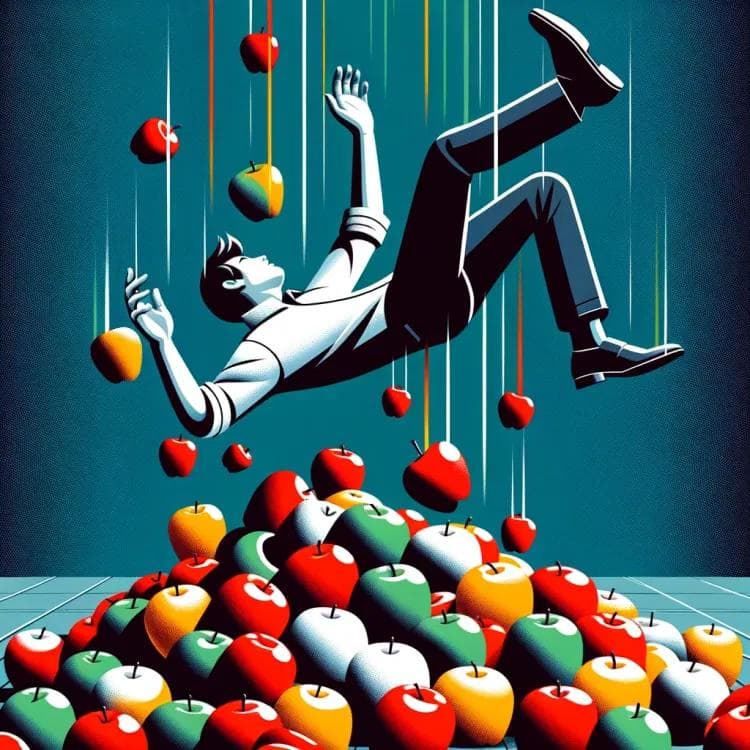“Tomber dans les pommes": Uncovering the Secrets of a Flavorful French Phrase

-
March 14, 2024
3/14/2024
Louis: Comment c'était ton concert hier soir ?
Marie: C'était très sympa. Par contre, quelle chaleur dans la salle !
Louis: Pas étonnant avec tout ce monde...
Marie: Oui, mais je ne me sentais pas bien, j'ai cru que j'allais tomber dans les pommes !
Who has never heard the expression "tomber dans les pommes" to designate someone who faints? This colorful way of talking about fainting intrigues as much as it amuses. But where does it exactly come from?
Behind this expression hide stories and surprising origins, showcasing the richness of the French language. Like many other expressions, "tomber dans les pommes" has evolved over time, adopting new meanings while retaining a part of mystery. Let's try to see more clearly.
Quand on dit "tomber dans les pommes", on veut dire que quelqu'un perd connaissance, comme si on s'évanouissait. Cette expression rigolote vient d'histoires anciennes et a changé de sens avec le temps. Cet article va vous raconter d'où elle vient et comment les gens l'utilisent aujourd'hui.
History and Origin
Fainting and Apples
The expression "tomber dans les pommes" has an origin that intrigues: it is believed to have come from the transformation of the word "pâmoison". In old French, "pâmoison" meant a state close to fainting, where one loses consciousness. Over time, the word "pam", related to fainting, transformed into "pomme". Thus, "tomber en pâmoison" became "tomber dans les pommes".
This linguistic metamorphosis illustrates how expressions evolve and adapt in the language.
Literary Influence
Another explanation finds its roots in literature. George Sand, a well-known writer, used the expression "être dans les pommes cuites" to describe a state of great fatigue, almost to the point of fainting. This expression evolved and simplified into "tomber dans les pommes", retaining this sense of extreme weakness.
The influence of George Sand shows the impact of writers on the language and how their creations can enrich our vocabulary.
On pense que "tomber dans les pommes" vient de l'ancien mot "pâmoison", qui veut dire presque s'évanouir. Autrefois, les gens disaient "pam" qui est devenu "pomme" avec le temps. Une célèbre écrivaine, George Sand, parlait aussi d'être "dans les pommes cuites" quand on est très fatigué.
Contemporary Use
The expression "tomber dans les pommes" continues to be part of our everyday language, used to express the idea of fainting or losing consciousness, often in informal or humorous contexts.
"Quand j'ai vu l'araignée géante dans ma chambre, je suis presque tombée dans les pommes, tellement j'ai peur de ces bestioles !" confie Sarah, toujours frissonnante.
"À l'annonce de ma promotion inattendue, j'étais tellement sous le choc que j'ai failli tomber dans les pommes de joie devant tout le bureau !" raconte Julien, encore ému par l'événement.
"Après avoir grimpé les derniers mètres du Mont Blanc, l'épuisement était tel que j'ai cru que j'allais tomber dans les pommes juste au sommet !" se souvient Mélanie, une passionnée d'alpinisme.
The expression has kept its meaning of extreme weakness or exhaustion, while becoming an expressive and colorful way to talk about a moment of physical vulnerability.
Aujourd'hui, dire "tomber dans les pommes" c'est une manière amusante de dire qu'on va s'évanouir, souvent utilisée quand on est très fatigué, qu'on a une forte émotion (la peur, la joie, le choc...) ou fait un gros effort physique.
Similar Expressions
The French language is full of picturesque expressions to describe specific feelings or situations. Here are some examples that, like "tomber dans les pommes", use colorful metaphors:
"Avoir les jambes en coton" : Used to express a sensation of weakness in the legs, often due to nervousness or intense physical effort.
"Avoir le cœur qui bat la chamade" : Refers to an acceleration of the heartbeat, usually caused by excitement, fear, or love.
"Avoir un coup de barre" : Familiar expression indicating a sudden feeling of tiredness or energy drop.
"Être vert de peur" : To describe someone who is so scared that it physically shows, up to imagining a greenish pallor.
Comme "tomber dans les pommes", il y a d'autres façons amusantes de parler de comment on se sent. Par exemple, dire qu'on a "les jambes en coton" quand on peut à peine tenir debout, ou "le cœur qui bat la chamade" quand on est très excité ou amoureux.
Conclusion
Exploring the origin and usage of expressions like "tomber dans les pommes" reminds us of the richness of the French language and its constant evolution. Understanding the meaning and origin of these phrases not only enriches our vocabulary but also allows us to appreciate the linguistic creativity that is passed down from generation to generation.
If you're curious to discover more French expressions and want to deepen your understanding of the language, Start French Now offers other fascinating articles on the subject.
We also invite you to View video courses on Udemy. These courses are designed to help you master French at your own pace, with clear explanations and practical examples.
Don't wait any longer to give your French learning a new boost!
"Tomber dans les pommes" nous montre comment le français est plein de surprises. En apprenant d'autres expressions, on peut mieux parler et comprendre le français. Start French Now a des cours sur Udemy pour vous aider. Allez voir ici !

Subscribe to our newsletter
Latest posts
Browse all posts
Subscribe to our newsletter
Stay informed and get a free video

